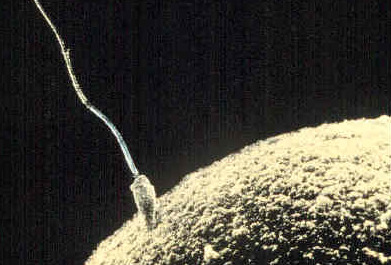Daily Mail
February 23, 2014
- Studies have found that as a man ages, his sperm becomes poorer quality
- Mutations cause stem cells in the testicles to divide abnormally
- This results in an increasing proportion of mutant sperm as men age
- Older fathers have higher risk of fathering a child with a disorder like autism
The longer a man delays fatherhood, the more likely his sperm is likely to become ‘mutant’, researchers have warned.
They say that older fathers have a higher risk of fathering a child with a disorder such as autism or schizophrenia.
An increasing body of evidence is showing that as a man ages, his sperm becomes poorer quality.
This is because mutations cause stem cells in the testicles to divide abnormally, resulting in an increasing proportion of mutant sperm as men age, New Scientist reports.
Some studies have even linked having an older father to Alzheimer’s disease, bipolar disorder (previously known as manic depression), heart disease and cancer.
Now, scientists warn that a man in his 40s is twice as likely to pass down potentially disease-forming genetic mutations as a man in his 20s – indicating that the biological clock ticks for men, too.
Plenty of high-profile men have become late-life fathers, including Steve Martin at 67, David at 53 and Des O’Connor, who became a father for the fifth time at 72.
For decades, scientists have speculated about links between older fathers and birth defects. But it was only recently that a groundbreaking study, published in the respected journal Nature, proved that men undoubtedly pass on more genetic mutations to their children as they get older.
Researchers sequenced the DNA of 78 Icelandic parents and their children and found a direct correlation between the father’s age and the number of mutations linked to autism spectrum disorders and schizophrenia in a child’s DNA.
The mother’s age had no bearing on their risk – indeed, the team found that 97 per cent of all mutations in a child’s DNA come from their father.
‘Society has traditionally been very focused on the age of the mother,’ says Dr Kari Stefansson, of Decode Genetics, a leading genetic research company, who led the study.
‘But it seems that disorders such as schizophrenia and autism are actually influenced by the age of the father and not the mother.’
Dr Stefansson’s report suggested that the apparently surging numbers of children diagnosed with autism may at least in part be explained by the ever-increasing age of fathers
Professor Andrew Wilkie, a clinical geneticist at the University of Oxford, discovered a link between older fathers and Apert syndrome.
This is a rare bone disorder which may result in an elongated head in children, and believes other conditions may also be affected.
‘It’s an important question that needs to be asked, because as the reproductive age increases, these age-related effects are likely to increase too,’ he says.
It is thought that just as a man’s memory and skin elasticity gets worse with age, the quality of his sperm seems to as well.
Crucially, unlike women who are born with a complete set of eggs, men continually make new sperm throughout their lifetime.
Every 16 days, cells in the testicles divide and the DNA in each cell is copied into a new one which is used to make new sperm.
The body is highly accurate at making an exact copy, but inevitably it sometimes makes mistakes. Some sperm will be made containing an error in the DNA – what’s known as a genetic mutation.
As a man gets older, the copying process becomes tired and less efficient and his sperm contains more mutations.
And if mutated sperm is then used to form a foetus, there’s more chance of problems in its development, says Professor Wilkie.
‘It’s a game of chance. It may be that this mutation does not occur in a critical place. But sometimes the game of chance is against you and the mutation hits a gene that will lead or predispose your child to a certain condition.’
So if the mutation is in the gene controlling brain development, for example, it can cause autism or schizophrenia.
And potentially if a mutation occurs in a gene affecting your risk of a type of cancer, it could increase the chances of the child getting it in later life.

